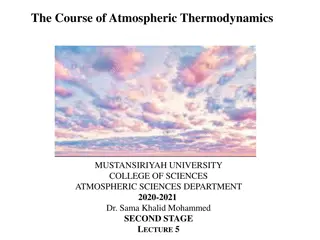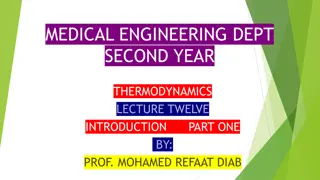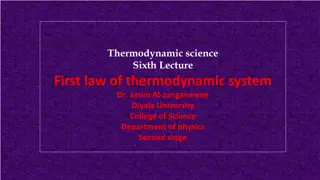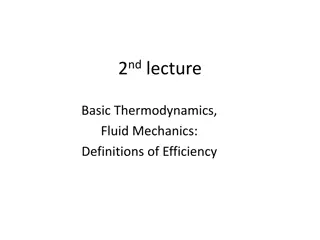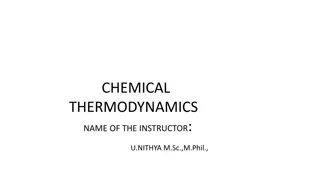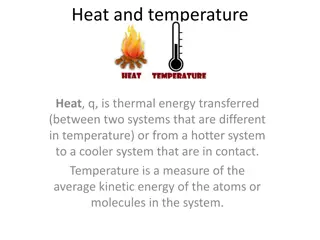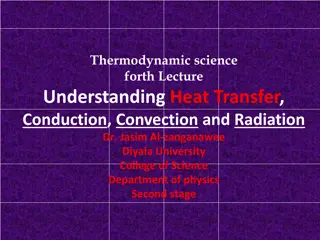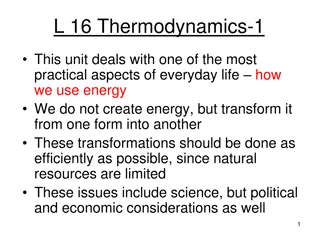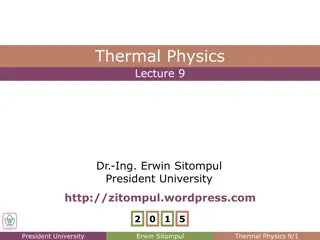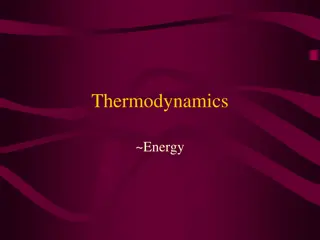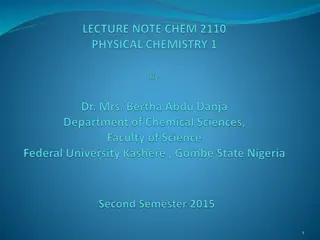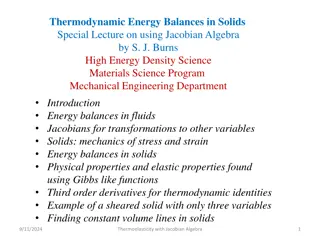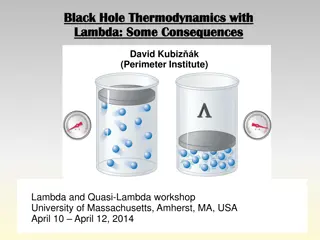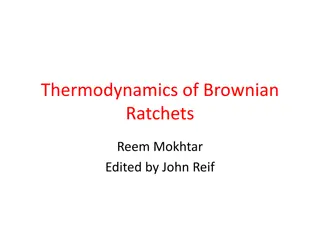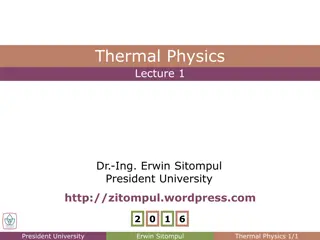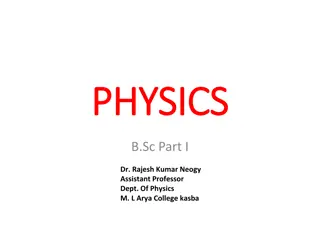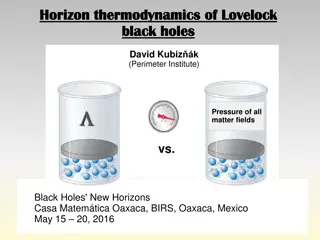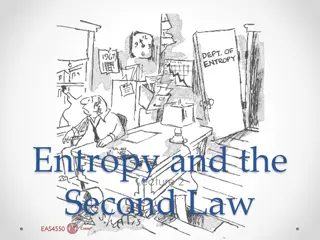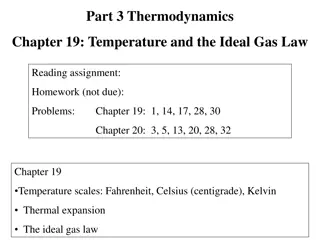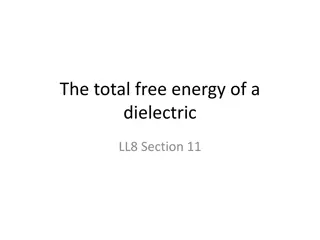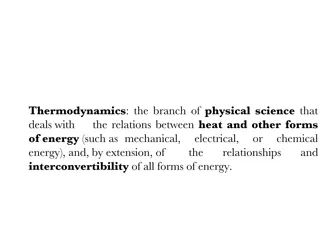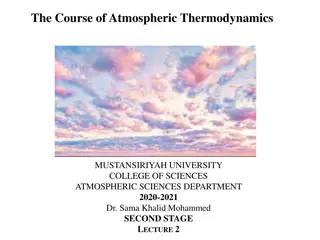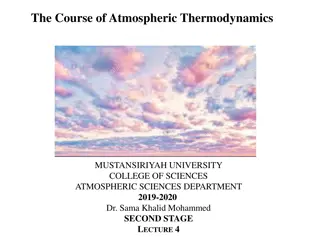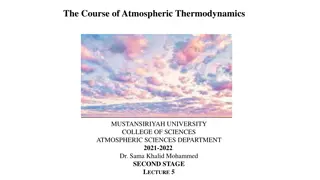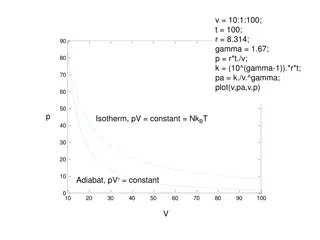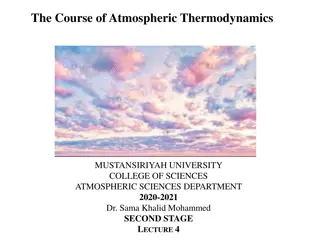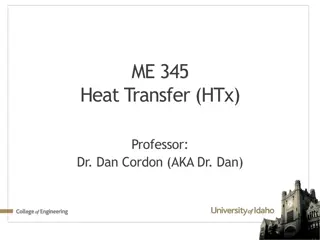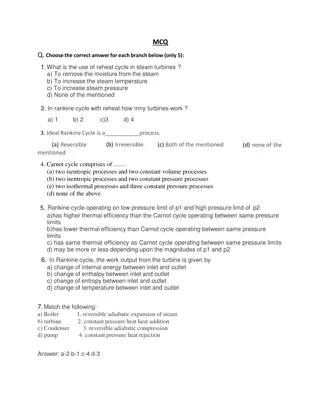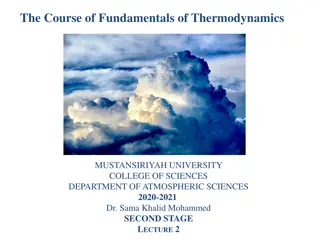Understanding Chemical Potential and Phase Equilibria in Solution Thermodynamics
The chemical potential and phase equilibria in solution thermodynamics are crucial concepts for understanding the behavior of mixtures at varying compositions and conditions. By investigating the fundamental property relation, partial molar properties, and the role of Gibbs energy, we can grasp how
5 views • 25 slides
Physics Presentation Slides on Rotational Motion, Thermodynamics, and Data-Based Questions
This collection features a series of presentation slides covering topics such as Rotational Motion, Thermodynamics, and Data-Based Questions in Physics. The slides provide visual explanations and discussions on concepts related to these areas, offering a comprehensive overview for learning and refer
2 views • 65 slides
Understanding Thermodynamic and Kinetic Characteristics in Adsorption Systems
Explore the thermodynamics and kinetics of adsorption through discussions on equilibrium thermodynamics, adsorption isotherms, kinetic measurements, technical applications, and interaction forces. Learn about the distinctions between physisorption and chemisorption, as well as the terminology associ
0 views • 7 slides
Thermodynamics of Solar Plasma: SAHA-S Equation of State and Recent Results
SAHA-S equation of state (EOS) presents the current state and recent results in thermodynamics of solar plasma. Key authors V.K. Gryaznov, A.N. Starostin, and others have contributed to this field over 20 years. The equilibrium composition between 145 species, including elements and all ions, is exp
1 views • 23 slides
Equations of State in Thermodynamics
In the study of thermodynamics, equations of state play a crucial role in predicting the behavior of substances based on pressure, volume, and temperature relationships. These equations define the interdependence of various intensive properties for a simple compressible substance. The development an
0 views • 42 slides
Understanding Atmospheric Thermodynamics in Second Stage Lecture
Explore key concepts in atmospheric thermodynamics, including condensation level, free convection level, and the use of thermodynamic diagrams. Learn about the process of condensation, stability levels in the atmosphere, and the significance of free convection in weather patterns. Discover why therm
0 views • 27 slides
Understanding Maxwell Equations in Thermodynamics
In thermodynamics, Maxwell equations are derived using Euler's reciprocity relation. They involve characteristic functions such as internal energy, free energy, enthalpy, and Gibbs free energy, along with parameters like temperature, entropy, pressure, and volume. These equations form the foundation
0 views • 15 slides
Understanding the First Law of Thermodynamics in Science Lectures
Explore the concept of the First Law of Thermodynamics through a series of engaging science lectures by Dr. Jasim Al-zanganawee from Diyala University. Learn about energy transfer, conservation, internal energy of ideal gases, and how heat and work impact a system's total energy. Discover the relati
0 views • 15 slides
Understanding Thermodynamics and Fluid Mechanics Fundamentals for Efficiency
Explore key concepts in thermodynamics and fluid mechanics such as the equation of continuity, the first law of thermodynamics, the momentum equation, Euler's equation, and more. Learn about efficiency, internal energy, and the laws governing energy transfer in various systems. Delve into topics lik
2 views • 12 slides
Understanding Joule-Thomson Coefficient in Thermodynamics
The Joule-Thomson coefficient describes the relationship between temperature and pressure changes in a substance. This coefficient impacts the direction of temperature change when pressure is altered. With equations and explanations provided by U. Nithya, M.Sc., M.Phil., this summary covers the defi
2 views • 11 slides
Introduction to Chemical Thermodynamics: Systems and Properties
Chemical thermodynamics explores energy changes in chemical reactions. It includes terms like system, surroundings, and boundaries. Systems can be isolated, closed, or open, each with distinct characteristics. Homogeneous and heterogeneous systems have different compositions. Properties in a system
0 views • 20 slides
Understanding Heat and Temperature in Thermodynamics
Thermal energy transfer, heat, and temperature play crucial roles in determining the behavior of systems in terms of kinetic energy and molecular motion. The zeroth law of thermodynamics establishes the relationship between heat and temperature. Heat transfer leads to changes in the average kinetic
8 views • 8 slides
Understanding Heat Transfer in Thermodynamics Lecture
This thermodynamics lecture covers essential topics such as heat transfer, conduction, convection, and radiation. Dr. Jasim Al-zanganawee from Diyala University explains Thermodynamic Processes, Internal Energy, Properties of a System, and Thermodynamic Cycles. Students will learn about extensive an
0 views • 11 slides
Understanding Thermodynamics and Energy Transformation
Thermodynamics is a crucial unit that deals with how energy is transformed from one form to another efficiently. This field is essential for managing energy resources sustainably and covers topics such as temperature, heat, internal energy, and applications in various systems. Learn the basics of th
0 views • 22 slides
Understanding the Carnot Engine: Application of the Second Law of Thermodynamics
Exploring the Carnot engine as an ideal model to understand the Second Law of Thermodynamics, which highlights the efficiency of heat engines and the concept of entropy. The engine operates through a cyclic process, transferring heat from a high-temperature reservoir to a low-temperature one, produc
0 views • 15 slides
Understanding Thermodynamics: Energy and Heat
Explore the fundamental concepts of thermodynamics, including the conservation of energy, entropy, heat transfer, and the relationship between temperature and kinetic energy. Discover how energy transforms in natural events, the laws governing thermodynamics, and the role of heat in the motion of pa
0 views • 28 slides
Understanding Geopotential and Geopotential Height in Atmospheric Thermodynamics
This lecture discusses the concepts of geopotential and geopotential height in atmospheric thermodynamics, including their definitions, significance, and relationship with gravity. It explains how geopotential is a measure of potential energy relative to sea level and how geopotential height serves
0 views • 17 slides
Understanding Kinetic Theory of Gases and Thermodynamics
Explore the fundamental principles of the kinetic theory of gases, including the five postulates and the relationship between macroscopic properties and microscopic phenomena. Delve into the concept of entropy and thermodynamics, along with the behavior of ideal and real gases. Gain insights into th
0 views • 116 slides
Understanding Thermodynamic Energy Balances in Solids with Jacobian Algebra
Explore the intricacies of energy balances in solids through the lens of Jacobian algebra, covering topics such as mechanics of stress and strain, Gibbs-like functions for physical properties, and third-order derivatives for thermodynamic identities. Unravel the application of Jacobians for transfor
2 views • 26 slides
Exploration of Thermodynamics in SU(3) Gauge Theory Using Gradient Flow
Investigate the thermodynamics of SU(3) gauge theory through gradient flow, discussing energy-momentum stress pressure, Noether current, and the restoration of translational symmetry. The study delves into lattice regularization, equivalence in continuum theory, and measurements of bulk thermodynami
0 views • 40 slides
Exploring Black Hole Thermodynamics and Lambda Effects: Insights and Consequences
Delve into the complex interplay between black hole thermodynamics and the cosmological constant Lambda, uncovering intriguing implications and theoretical challenges. Dive deep into the thermodynamic properties of black holes, the role of pressure and volume, and the intriguing parallels to everyda
0 views • 29 slides
Understanding Thermodynamics: Laws and Maxwell's Demon
Explore the laws of thermodynamics including the first, second, and third laws, and Maxwell's Demon thought experiment challenging the second law. Learn how entropy and energy are fundamental concepts in thermodynamics.
0 views • 18 slides
President University Thermal Physics Lecture by Dr. Erwin Sitompul
President University offers a Thermal Physics course with lectures delivered by Dr. Erwin Sitompul. The course covers topics like the First Law of Thermodynamics, Kinetic Theory, and the Second Law of Thermodynamics. Students are required to maintain handwritten notes, submit homework on time, and u
0 views • 27 slides
Introduction to Thermodynamics: Laws, Concepts, and Applications
Thermodynamics is the study of energy and its transformations within systems. This article delves into the laws of thermodynamics, defining key quantities like temperature and entropy. It explains the importance of thermodynamic systems, boundaries, and surroundings, highlighting closed, open, and i
0 views • 12 slides
Horizon Thermodynamics of Lovelock Black Holes by David Kubiz
Gravitational dynamics and thermodynamics in Lovelock black holes are explored in this talk, discussing free energy, universal thermodynamic behavior, Lovelock gravity, and beyond spherical symmetry. References include works on black hole thermodynamics, local Rindler horizons, and apparent horizons
0 views • 25 slides
Thermal Physics Lecture by Dr. Erwin Sitompul at President University
Dr. Erwin Sitompul delivers Thermal Physics Lecture at President University covering topics like First Law of Thermodynamics, Kinetic Theory, and Second Law of Thermodynamics. The course includes a Grade Policy involving notes, homework, quizzes, and exams, with additional points for problem-solving
0 views • 28 slides
Exploring Entropy and the Second Law of Thermodynamics
This lecture delves into the concepts of entropy and the Second Law of Thermodynamics. It discusses the intuitive sense of energy, the nature of entropy, and the irreversibility of processes. The Second Law is highlighted in relation to heat transfer, work, and the increase of entropy in the univers
0 views • 23 slides
Understanding Temperature Scales and the Ideal Gas Law
This comprehensive guide delves into temperature scales, thermal expansion, and the ideal gas law. Explore the origins of Fahrenheit, Celsius, and Kelvin scales, and learn how to convert between them. Discover the concept of heat, thermal equilibrium, and the Zeroth Law of Thermodynamics. Gain insig
0 views • 14 slides
Understanding Basics of Thermodynamics and Energy Principles
Explores fundamental concepts in thermodynamics, including energy, the first law of thermodynamics, heat vs. temperature, system vs. surroundings, direction of heat flow, thermal equilibrium, exothermic vs. endothermic processes, and units of energy. Learn about energy conversions, conservation, and
0 views • 24 slides
Understanding Thermodynamics of Dielectrics
Exploring the thermodynamics of dielectrics involves analyzing the free energy associated with the electric field interactions in these materials. By considering changes in field and total dipole moment, we can calculate the total free energy density and understand the impact of external factors on
0 views • 12 slides
Understanding Thermodynamics: The Science of Energy Relations
Thermodynamics is a branch of physical science that focuses on the relationships between heat and various forms of energy, exploring the interconvertibility of energy types. It involves the study of systems, surroundings, phases, components, and reactions, with a primary focus on macroscopic energie
0 views • 99 slides
Understanding Atmospheric Thermodynamics in Meteorology
Explore the fundamentals of atmospheric thermodynamics including dry air properties, dry adiabatic lapse rate, moist air components, and saturated adiabatic lapse rate. Delve into concepts like dew point temperature, relative humidity, and wet bulb temperature to gain insight into air behavior in va
0 views • 22 slides
Understanding Atmospheric Thermodynamics and Humidity Measurements
Explore the key concepts of atmospheric thermodynamics including wet bulb temperature, wet bulb depression, dew-point temperature, and relative humidity. Learn how meteorologists use psychrometric charts to measure humidity and analyze air moisture content. Discover the significance of wet bulb depr
0 views • 20 slides
Understanding Atmospheric Thermodynamics and Environmental Lapse Rate
Explore the concepts of atmospheric thermodynamics including the Parcel Method, Environmental Lapse Rate, and Conditionally Unstable Atmosphere. Dive into the details of how air parcels behave in different atmospheric conditions and understand the significance of temperature changes in the atmospher
0 views • 27 slides
Understanding the Carnot Cycle in Thermodynamics
Explore the principles of the Carnot cycle, efficiency of a Carnot engine, and the significance of isotherms and adiabats in thermodynamics. Gain insights into the working of such engines and their efficiency calculations through a series of informative visual representations.
0 views • 32 slides
Understanding Atmospheric Thermodynamics: Key Concepts and Applications
Exploring the principles of atmospheric thermodynamics in a lecture by Dr. Sama Khalid Mohammed at Mustansiriya University. Topics covered include air parcel behavior, relative humidity definitions, and factors affecting humidity levels. Gain insights into saturation, supersaturation, and how temper
0 views • 22 slides
Understanding Heat Transfer in Engineering Systems
Exploring the fundamental concepts of heat transfer and thermodynamics, this collection of images and explanations delves into the processes governing temperature change, energy transfer, and the analysis of systems based on the conservation of energy. From distinguishing between heat transfer and t
0 views • 16 slides
Engineering Thermodynamics Multiple Choice Questions
This content covers various topics related to engineering thermodynamics through multiple-choice questions. It includes concepts such as the use of reheat cycles in steam turbines, ideal Rankine cycles, Carnot cycles, and the efficiency of different cycles. Questions on the Rankine cycle, working fl
0 views • 4 slides
Problems in Thermodynamics: Solving Heat Transfer Scenarios
Explore various heat transfer scenarios involving cooling objects, energy conservation, and equilibration of temperature between different substances like water, tungsten, and metals. Learn how to calculate heat lost or gained in each situation while applying the principles of the first law of therm
0 views • 21 slides
Understanding the Fundamentals of Thermodynamics in Atmospheric Sciences
Explore the key concepts of thermodynamics in atmospheric sciences as discussed in the second stage lecture, covering topics such as extensive versus intensive variables, reversible and irreversible processes, cyclic processes, and thermodynamic variables. Gain insights into properties of systems, w
0 views • 22 slides





